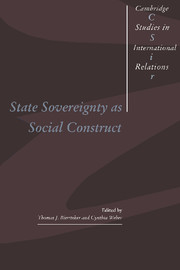Book contents
- Frontmatter
- Contents
- List of figures
- List of contributors
- Acknowledgments
- 1 The social construction of state sovereignty
- 2 Contested sovereignty: the social construction of colonial imperialism
- 3 Beyond the sovereignty dilemma: quasi-states as social construct
- 4 The sovereign state system as political-territorial ideal: historical and contemporary considerations
- 5 Sovereignty and the nation: constructing the boundaries of national identity
- 6 Sovereignty, nationalism, and regional order in the Arab states system
- 7 Binding sovereigns: authorities, structures, and geopolitics in Philadelphian systems
- 8 Hierarchy under anarchy: informal empire and the East German state
- 9 Reconstructing the analysis of sovereignty: concluding reflections and directions for future research
- Index
- Titles in the series
7 - Binding sovereigns: authorities, structures, and geopolitics in Philadelphian systems
Published online by Cambridge University Press: 01 June 2011
- Frontmatter
- Contents
- List of figures
- List of contributors
- Acknowledgments
- 1 The social construction of state sovereignty
- 2 Contested sovereignty: the social construction of colonial imperialism
- 3 Beyond the sovereignty dilemma: quasi-states as social construct
- 4 The sovereign state system as political-territorial ideal: historical and contemporary considerations
- 5 Sovereignty and the nation: constructing the boundaries of national identity
- 6 Sovereignty, nationalism, and regional order in the Arab states system
- 7 Binding sovereigns: authorities, structures, and geopolitics in Philadelphian systems
- 8 Hierarchy under anarchy: informal empire and the East German state
- 9 Reconstructing the analysis of sovereignty: concluding reflections and directions for future research
- Index
- Titles in the series
Summary
The Westphalian and the Philadelphian systems
The relationship between forms of legitimate political authority and the capacities of coercive power has been at the center of the Western study of politics since the ancient Greeks began systematically investigating politics. At least since the Middle Ages, these debates have been about “sovereignty.”
Because the modern European system has expanded globally over the last half millennium, students of international politics have focused on the Westphalian system of sovereign states as a paradigm so much that it seems inevitable and universal.
The essentials of the Westphalian system, codified as the core of realist international relations theory, are widely accepted. Westphalian realists presume a dyadic conception of political order: hierarchy inside and anarchy outside. Thus sovereign authority has two faces, an inside and an outside. Inside the territorial units, the sovereign state monopolizes the violent power that creates a hierarchy of higher and lower authorities. To avoid ambiguity, a hierarchically structured unit should be called a “hier-state.”
Outside and between states, authoritative governance is absent or fleeting. But interstate order exists, primarily because of two institutions and practices: mutual recognition of sovereignty and the balance of power. State sovereigns extend to one another the system of mutual recognition that creates a society of states, reflecting and embodying state supremacy, while moderating state power and anarchy. As Martin Wight, Hedley Bull, and others have noted, this European society of states existed in addition to the anarchical and balance-of-power system of states.
- Type
- Chapter
- Information
- State Sovereignty as Social Construct , pp. 190 - 239Publisher: Cambridge University PressPrint publication year: 1996
- 22
- Cited by



